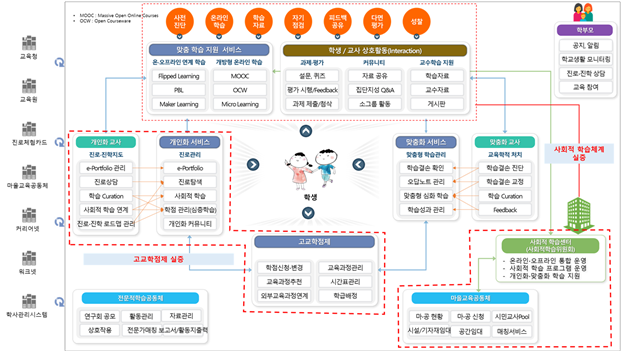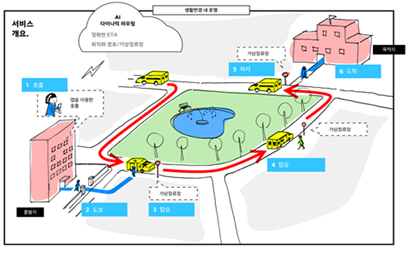□ The Ministry of Land, Infrastructure, and Transport regulates two smart demonstration projects* implemented in Sejong City (designated as '9 Smart Regulatory Innovation Zone) after consultation with related ministries and the 11.12th National Smart City Committee deliberation (20.9). A special case was given.
* ① Demand-responsive bus, ② Online platform for high school credit system operation (Edutech Cloud)
<Outline of the 9th National Smart City Committee>
ㅇ Time/所: '20.11.12(Thu) / Korea Agency for Infrastructure Technology Advancement (KAIA) Smart City Business Unit Yongsan Conference Room
ㅇ Member: A total of 25 government and private members, including land, science and technology, equipment, and MOPAS
ㅇ Agenda: Report on the status of smart city promotion, revision of committee operating rules and approval of the 2nd regulatory sandbox
ㅇ The'Edutech Cloud' project (Ubion Co., Ltd.), which aims to operate customized education for students using an online platform supporting the high school credit system and a social learning system based on citizen instructors, is a condition of implementing the project at an autonomous school. Special cases have been given under the “Elementary and Secondary Education Act” to enable'classes without textbooks'.
ㅇ The current 「Passenger Vehicle Transportation Act, in which a limited license is granted only to vulnerable areas such as farming and fishing villages to the demand-responsive bus'Suckle' (Hyundai Motor Co., Ltd.) that operates a real-time route according to passenger demand using an artificial intelligent route setting algorithm. 」With the award special, it will be possible to provide related services to the downtown area of Sejong City.
ㅇ For the two cases approved this time, the project is scheduled to commence within this year after reviewing the subscription of liability insurance and support for proof project expenses.
* Demonstration period within 4 years (can be extended once), support within 1 million won per project
□ The Ministry of Land, Infrastructure, and Transport has approved a total of 2 cases, including 9 regulatory exceptions and 5 active administration cases, since the introduction of the smart city regulatory sandbox* system in February of this year. has been solving
* A system that gives special cases for new products and services using new technologies to allow market launch, test and verification by delaying the current regulations under certain conditions (period, place, scale)
□ The Ministry of Land, Infrastructure, and Transport plans to expand the areas subject to regulatory sandboxes nationwide through system improvement so that various innovation service experiments will become more active, and the private sector will be able to quickly check the results.
ㅇ After designating a smart regulatory innovation district, the current system that approved smart demonstration projects within the district is in the process of revising the Smart City Act so that applications can be applied without district designation, and a regulatory quick confirmation** system is also being established.
* Representative proposal of Representative So Byeong-hoon of the National Land Transportation Commission
** When the project operator applies to MOLIT, the regulatory authority will receive a reply within 30 days and notify
ㅇ In addition, we plan to reorganize the Smart City website (homepage) so that the once-a-year competition system can be accepted online*, and we plan to discover and support necessary regulatory improvements by reinforcing the pre-consulting function of law firms.
* Information on the regulatory sandbox system, online consultation and application support (http://smartcity.kaia.re.kr)
- Edutech Cloud for K-12 Future Education Transformation: A Case of Demonstration

2. Community Demand Response Mobility Circle: Special Case for Demonstration




